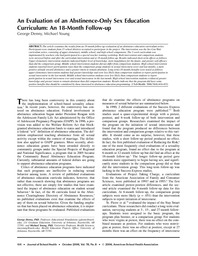
ATTENTION: The works hosted here are being migrated to a new repository that will consolidate resources, improve discoverability, and better show UTA's research impact on the global community. We will update authors as the migration progresses. Please see MavMatrix for more information.
Show simple item record
| dc.contributor.author | Denny, George | |
| dc.contributor.author | Young, Michael | |
| dc.date.accessioned | 2014-07-02T18:52:41Z | |
| dc.date.available | 2014-07-02T18:52:41Z | |
| dc.date.issued | 9/15/2006 | |
| dc.identifier.citation | Journal of School Health, October 2006, Vol. 76, No.8, 2006, pgs: 414-422 | en_US |
| dc.identifier.issn | 0022-4391 | |
| dc.identifier.uri | http://hdl.handle.net/10106/24332 | |
| dc.description.abstract | The article examines the results from an 18-month follow-up evaluation of an abstinence education curriculum series.
Participants were students from 15 school districts recruited to participate in the project. The intervention was the Sex Can Wait
curriculum series, consisting of upper elementary, middle school, and high school components. The 5-week curriculum was
implemented by teachers who had participated in a special teacher training workshop. Both intervention and comparison students
were surveyed before and after the curriculum intervention and at 18-month follow-up. Results indicated short-term effects as follows.
Upper elementary intervention students indicated higher level of knowledge, more hopefulness for the future, and greater self-efficacy
than did the comparison group. Middle school intervention students did not differ from comparison students. High school intervention
students reported lower participation rates than the comparison group students in sexual intercourse (ever and last month), a more
positive attitude toward abstinence and a greater intent to remain abstinent. Long-term (18 month) benefits were noted as follows:
upper elementary intervention students had greater knowledge and were less likely than comparison students to report participation in
sexual intercourse in the last month. Middle school intervention students were less likely than comparison students to report
participation in sexual intercourse ever and sexual intercourse in the last month. High school intervention students evidenced greater
knowledge and greater intent to remain abstinent than did comparison students. Results indicate that the program did have some
positive benefits that should be considered by those interested in abstinence education programming. (J Sch Health. 2006;76(8):414-422) | en_US |
| dc.language.iso | en_US | en_US |
| dc.publisher | American School Health Association | en_US |
| dc.subject | Sex education | en_US |
| dc.subject | Grade school students | en_US |
| dc.subject | Abstinence | en_US |
| dc.title | An Evaluation of an Abstinence-Only Sex Education Curriculum: An 18-Month Follow-up | en_US |
| dc.type | Article | en_US |
| dc.identifier.externalLink | http://onlinelibrary.wiley.com/doi/10.1111/j.1746-1561.2006.00135.x/pdf | en_US |
| dc.identifier.externalLinkDescription | The original publication is available at article DOI | en_US |
Files in this item
- Name:
- an evaluation of an abstinence-only ...
- Size:
- 109.7Kb
- Format:
- PDF
- Description:
- article
This item appears in the following Collection(s)
Show simple item record


